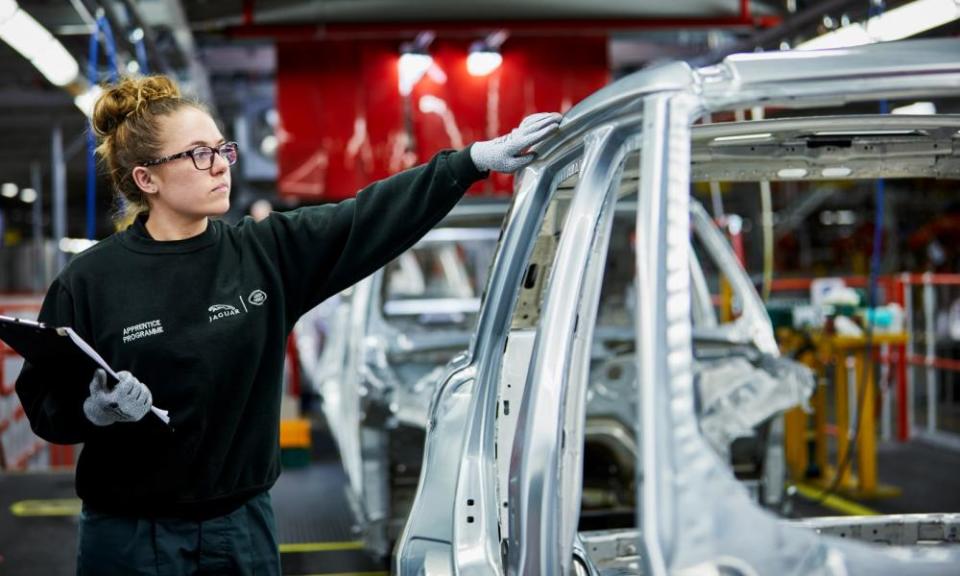There’s no panic yet: but Trump’s trade war could get out of hand

It’s a skirmish, no more than that. The trade tariffs going up around the world might be adding millions to the cost of importing goods, but it’s not a war and it won’t mean the end of global growth. Or at least that seems to be the general view. The International Monetary Fund (IMF), the Organisation for Economic Cooperation and Development (OECD), and the majority of investment banks and thinktanks do worry about the latest round of niggly tit-for-tat tariff battles. They have condemned them, and some – including the IMF’s boss, Christine Lagarde – have rounded on the main protagonist: President Donald Trump. But have they begun to panic? Not yet.
The European Union’s retaliation against steel and aluminium tariffs imposed by Trump were announced last week and amounted to $3.4bn on US products including bourbon, peanut butter and orange juice.
It’s virtually the same targets the EU picked in 2002 when George W Bush thought it might profit him to slap steel and aluminium tariffs on European suppliers.
The sum of money involved is small and, compared to the trillions of dollars traded each year, almost a rounding error. But in 2002 it worked and Bush backed down.
It was humiliating, yet not as bad as angering dozens of Republican senators from swing states that rely on donations from bourbon makers and the votes of peanut farmers. Worse, Bush’s brother Jeb, then governor of Florida, was feeling the squeeze from EU tariffs on oranges.
However, Trump’s target is not only Europe: it’s China as well. And in two weeks, the US will start taxing $34bn of Chinese goods. Beijing has vowed to immediately retaliate with its own tariffs on American soybeans and other farm products.
An escalation of tariffs between the world’s two largest economies should not be downplayed. A civilised argument with the EU is one thing: a determined effort to punish China for a long list of trade-related misdemeanours is another.
The battle seemingly has no end and the fallout might not just cost consumers money: it might also destabilise decades-old global trading arrangements.
Trump’s comment that he wanted to banish the sight of Mercedes cars in New York followed his administration opening a trade investigation into vehicle imports, which he tweeted on Friday would result in 20% tariff on cars unless action was taken by the EU. “Build them here,” he told carmakers, even though many do boast large or expanding plants in the US.
A 20% tariff, up from 2.5%, on the cost of a foreign car could lower eurozone GDP by 0.3% at least, says Bank of America Merrill Lynch. It would take a 7.5% appreciation in the value of the dollar, and a concomitant rise in the purchasing power of prospective American customers, to offset such an increase.
“If the US raised tariffs to European cars to 25% and 10% on all other products, 0.7% of euro area GDP could be at risk,” the bank said last week. To protect eurozone exporters from any losses, the dollar would need to rise to parity with the euro (something that Trump might perhaps even like, as a symbol of macho success).
So tariffs such as those in prospect would hurt the car industry – and none more so than the UK’s: Jaguar Land Rover is a huge exporter to the States.
In April, Lagarde warned of “darker clouds looming” for the global economy amid simmering trade tensions. She warned governments around the world to steer clear of protectionism or face negative consequences.
Yet her call to “resolve disagreements without using exceptional measures” looks like being ignored by a White House packed with evangelists who see protectionism as a source of hard power.
Airbus move should sound alarm bells on Brexit
A visit to the impressive Airbus factory in Broughton is an insight into state-of-the-art manufacturing and what it means to a workforce, a region and a country. Its 6,000 employees have well-paid, highly skilled jobs that bring vital income to the north Wales economy and the site is a flagship for a British manufacturing industry that, while much smaller than it was at its 20th century peak, sustains world-class pockets of production such as Broughton. Airbus’s UK operations as a whole bring tax revenue of £1.7bn a year to the country.
So the public and politicians should sit up in alarm when Airbus, a Franco-German business, says that it could ditch UK wing-making plans over concerns that European Union regulations will no longer apply from March 2019 and amid uncertainty over customs procedures. Instead, it would opt to transfer production to North America, China or elsewhere in the EU.
Airbus’s Hamburg hub, for instance, would love to get the wing-making work that could be made available by a hard Brexit.
There is a solution to this: secure access to the single market and stay in a customs union. It would be very unwise to count on calling Airbus’s bluff. Airbus does not draw up long-term investment plans on the side of a bus. These are serious calculations that, once enacted, could result in Britain losing one of its greatest manufacturing assets.
Thanks to Broughton and a sister facility in Filton, Bristol, the UK can count airplane wings as among its few world-leading exports.
This ranks Broughton alongside Rolls-Royce for aircraft engines, GlaxoSmithKline for pharmaceuticals and Unilever for food.
If prime minister Theresa May does not act in the best interests of the country’s economy and thousands of Airbus workers, that list will diminish rapidly.

The empire strikes back against Star Wars?
The most surprising aspect of the lacklustre box-office performance of Solo: A Star Wars Story is the one thing that should have mattered to audiences: it is not a terrible film.
Nonetheless, its US takings of nearly $200m paled in comparison with recent Star Wars films and its foreign box office takings, of around $150m, is an awful number that includes scathing indifference (a mere $16m in takings at time of writing) from the all-important Chinese audience. A costly production that involved extensive reshoots after its original directors quit following “creative differences” with producers, it is supposedly expected to lose $50m, in a rare reversal for Disney, owner of Lucasfilm and the Star Wars universe.
Disney therefore did the right thing last week in reportedly deciding to cancel all spin-off or “anthology” projects related to the franchise – and stick instead to producing its main Star Wars trilogies. If box office success is an alchemical thing – a mix of talent, good timing and hoping that a marketing blitz drags people away from Netflix – then failure can be equally puzzling.
But the media group has apparently got a hunch that it has saturated the global blockbuster market, which it dominates anyway, with one too many lightsabers. Solo came out just six months after The Last Jedi, an official entry in the Star Wars canon (as the second film in a third official trilogy) that was lucky to accrue more than $1.3bn in ticket sales after dividing opinion among Star Wars devotees.
It shows that Disney is reverting to a proven formula that it had discarded in the case of Solo. Part of Disney’s enormous success at the box office in recent times is down to limiting its annual output to a handful of big-hitting projects - such as Black Panther and the forthcoming Mary Poppins sequel – with obvious globe-straddling appeal. The decision to cancel further Solo-style projects is proof that less is more if you want to succeed in Hollywood now.

 Yahoo Finance
Yahoo Finance 